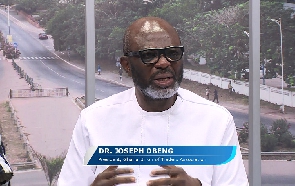- Home - News
- TWI News | TV
- Polls
- Year In Review
- News Archive
- Crime & Punishment
- Politics
- Regional
- Editorial
- Health
- Ghanaians Abroad
- Tabloid
- Africa
- Religion
- Election 2020
- Coronavirus
- News Videos | TV
- Photo Archives
- News Headlines
- Press Release
General News of Saturday, 19 March 2011
Source: The Herald
UK Firm Exposes Oil Fraudsters
The oil industry has been bedeviled by many fraudulent activities and actors scattered world-wide in the Americas, Europe, Africa, Asia and the Middle East, where most of the world’s oil supply is produced.
Until recently, the fraudulent practices in the oil industry have been unknown in Africa, Ghana in particular.
Roguery in the industry has been brought home to us in West Africa, following the discovery of oil in commercial quantity in Nigeria, whose citizens have teamed up with some foreigners and their companies to defraud unsuspecting countries of millions of dollars under the guise of selling to them much-needed crude.
For many years, the activities of these fraudsters in the industry have been followed carefully by concerned institutions and governments.
Below, The Commercial Crime International, in its March, 2011 issue, has provided answers to how, what and who are involved in these operations-how the fraud has been carried out globally for the past thirty years.
Oil fraud has been a recurring theme during the 30 years the IMB has been in business, and in the early years much of its times was spent trying to prevent Nigeria oil frauds in particular.
It’s been reasonably quiet on the oil fraud front in recent years, but now details of another scheme have come to light that appear to leverage the growing role of Ghana in oil trading.
It would be easy to reject this current advance fee scam as little more than a few people hiding behind a crude web of mostly phantom companies trying to outdo each other to con naïve traders, but as the IMB explains their actions have potentially harmful consequences for those inadvertently caught up in their activities.
*Real risks*
Legitimate companies can be subject to threats of legal action as victims seek to recover their losses from those they believe have deeper pockets, and victims have been known to threaten physical harm to employees of those companies they think are involved in the scam, as in an earlier case.
In addition, shipowners may incur costs if one of their vessels is arrested by a victim of the fraud expecting arrival of his cargo at the discharge port. In the end, the shipowners will successfully defend his position, as will the true consignee of the cargo to whom delivery of the cargo may have been suspended pending a judicial decision regarding the identity of the true owner of the cargo.
Even so, given that the cargo may be worth many tens of millions of US dollars, both shipowners/charterer and the cargo owner, may incur heavy cost and management time to resolve this dispute.
In the current economic climate this can have an even greater impact on the bottom line. And banks are not immune either. Money paid as an advance fee must pass through the banks, leaving them open to charges of a lack of proper due diligence in helping the fraudsters spirit away the proceeds of a crime, even if it is quickly transferred across borders, which raises the risk of proceeds of crime actions down the line.
*Chartering system exploited*
The largest fraud, reported by an IMB member last month, seeks to abuse the ship chartering mechanism to gain credibility. In fact, its approach is full of holes, but potential victims unfamiliar with chartering protocol or, indeed, Nigerian oil trading practices, won’t know that. Despite this, it works. There is at least one example on record last year of a victim paying an advance fee – said to be $50,000 – in the belief that it was about to charter a ship full of oil.
The latest incident marks the fraudsters’ attempt to leverage the information it gleaned from a previous bid to charter the vessel to have another go. And it might have worked but for a fatal flaw; the ship it targeted to charter to the victim had been scrapped in the interim!
As the IMB member only reported the parts of the attempted fraud that involved them, IMB investigators have tried to piece together what else went on. The origins of the fraud can be traced back to February 2009 when a company we’ll call NN enquired about chartering a vessel from the IMB shipowner member. A suitable vessel was identified and its details sent.
Discussions resumed in June with negotiation for a 30-day time charter to NN. Offers were exchanged, before NN said it had a better one with a Danish shipping company for another larger vessel.
The shipowner believed this to be an end to the matter until, in July, it was contacted by a law firm said to be representing a trading company with offices in Switzerland and BVI. The lawyers sought clarification that its vessel was loaded with 50,000MT Bonny light crude oil, said to be the property of its client, and asking to sign a charter party so the vessel could be taken to discharge in Ghana.
When the shipowner said this was not the case, the trading company asked for clarification of the named vessel’s details, saying it had negotiated a charter party for the vessel with NN (who had apparently been recommended to them) and had deposited money on the basis of a ‘pre-chartering possibility’ as proof of its capacity to finance the transaction. Moreover, it said that NN would not return this money as it already had a ‘pre-charter agreement with the owners’.
In its defence, the shipowner said it gets this kind of suspect request to charter vessels three or four times a year and mostly ignores them.
However, the nature of its trade and relationship with some of its oil terminal customers meant that some approaches were sufficiently plausible to warrant a response. At the time it informed both the IMB and its P&I Club of the incident, and was advised there were few practical steps it could take to protect its vessel from being targeted in this manner, save keeping written responses to a minimum. The IMB noted that there had been cases where “past responses, sent entirely in good faith, had later been adulterated to suit the purposes of those behind such schemes.” And it seems this is what has happened here.
*Recycling Information*
In January, the shipowner received an email out of the blue from someone we’ll call AA asking to recharter the same vessel. It said he understood the vessel’s charter party was due to expire in the next few days, and asked for details of the procedure to do this.
The shipowner immediately knew this was fraud as the vessel was already scrapped. When it confined its response to saying simply that the vessel was not available, it got a reply asking if NN was its representative in Nigeria, to which it said the company does not have representatives in Nigeria.
The original emails had been copied to people named as JB, TF and AL. A day later, TF emailed the shipowner to say that the “vessel has been loaded by us and is in Togo waters. He asks for the contact details of the Captain so he can ask him to sail to Tema (Ghana) Refinery to discharge the 70,000MT Bonny light crude aboard tomorrow if possible. He also says the vessel is chartered to a company called AP in Ghana (of whom AA is listed as a director).
Bearing in mind that the vessel had already been scrapped and that the 70,000MT allegedly loaded was significantly more than it could have carried anyway, the shipowner confined its response to a simple statement that the ship was not loaded with this cargo. AA seems to have withdrawn from the scam at this point, presumably recognizing that as NN was not the shipowner’s representative his company could not have chartered the vessel.
But that was not the end of things. Perhaps seeking a replacement, the same day TF sent an email to a company called HP Ghana Ltd in which he asks that two cheques for 10million Naira ($65,000) each be written to two entities called MP Ltd and FGE Ltd. In it he also gave the shipowner’s contact details and added “if they tell you the vessel is not available, tell them it’s already loaded and meant for Ghana, and she (the shipowner contact) may make a special arrangement.
A return email from HP to TF says the company is already to do business but that they have had problems with FGE before. As an aside to the main course of this scam, FGE protested to HP about the slur on its good name. When HP checks with the shipowner about the possibility of chartering the vessel, it is also told there is no loaded ship and it has nothing to do with this deal. HP thanks the shipowner for this and no more is heard from any of the parties. It is assumed that HP has withdrawn from the deal.
*Dodgy Documents*
An interesting element to the HP/shipowner exchange is that in its bid to confirm the vessel is available for charter, HP attaches two documents relating to the earlier victim, the BVI registered trader.
These included a very crude, hand-written invoice from a company allegedly in Canada requesting payment of $175, 000 for “One Charter” (of the named vessel) and bunkers. It is dated 25th January 2010, and says, in handwritten scrawl, “this charter agreement is valid for 360 days”.
Moreover, not only is the invoice handwritten, a quick check reveals that the company and its given address do not exist. The other document is supposedly the full charter party agreement between the fictitious Canadian company and the BVI trader (earlier victim); also a complete forgery.
Other documents seen by the IMB relating to the various parties in this fraud include a letter dated June 2010 from the BVI trader to NN confirming the voyage charter of the vessel allegedly obtained from the Danish shipping company, together with (alleged) evidence (from a major trade bank) that it had a $ 40m line credit with which ‘to pay the freight and other incidental costs of this voyage’ (from Cotonou to Tema). There is also a copy of NN’s alleged National Petroleum Authority Licence (with its name written in pen) to procure, import, supply and sell crude oil to Ghana dated August 2008, and a letter from NPA Ghana attesting to NN’s grant of an oil trading licence at a cost of $20,000, it is unlikely either of these document is genuine.
*Spotting the Danger Signs*
Hopefully, the narrative above will enable other shipowners to detect similar fraudulent approaches.
Members are encouraged to report any found to the IMB, which has in the past been able to carry out more research if necessary and even, if appropriate, contact the fraudsters direct to tell them to desist.
Companies familiar with Nigerian oil trading know how the business works, it says, and that, for instance, a typical lift is in the region of 100,000MT and that Nigerian oil is now sold through prescribed channels designed specifically to stop this kind of scam.
Whilst companies with no history of oil trading are most likely to get ensnared in this fraud, possibly because they see new opportunities now that Ghana is fast becoming an oil player in the region, their actions have potential consequences for industry professionals, as we have explained, it adds.
In the case, the IMB says it’s not entirely clear who is victim and who is fraudster. Investigations have revealed some fairly disturbing information on several parties involved, which indicate a possible conspiracy of ‘dodgy’ traders, any of which could pose ongoing problems for shipowners and banks. NN appears to be at the heart of things, however, and little of the information it gives appears to have any foundation in fact.
NN lists an address in Lagos that doesn’t exist and another in London that is frequently used as a mail drop by Nigerian 419 fraudsters.
The telephone number given is for one that can be diverted wherever the account holder wants. Its website, which is registered in Texas to a man listed as a director of NN UK and who has previously been reported to the IMB on four occasions in connection with Nigerian oil frauds, has changed its IP address 93 times on 15 different serves in the past seven years.
The website claims NN is an oil trader and lists 10 vessels it says are available for charter. But eight of these 10 vessels are no longer trading, having either changed their name or been scrapped. In addition, the director is known to have emailed shipowners in several occasions, asking them (as in this case) to confirm the position of vessels are elsewhere, but he usually refers a fraudulent bill of lading.
Interestingly, there also appears to be a link between NN and a company in the UK – UIDC- operating from offices in Milton Keynes that may operate as an agent for NN roping in potential victims wanting to trade in oil. UIDC was certainly involved as introducer in the fraud last summer involving the BVI trader, UIDC was also referred to the IMB in 2008 in relation to an irregular contract to purchase dredging equipment.
TF meanwhile claims to be the president/CEO of a company called TI Ltd, which its website says is a supplier of Bonny light crude oil to end users around the world. The website lists an address in Edmonton, Canada, which appears to be residential, but no record of the company being registered in
Canada could be found. Whilst the IMB has no information on TF per se , his company claims an association with another that was referred to the Bureau last year as the purported charterer of a vessel whose name was used as part of a Nigerian oil fraud.
As for the others, AA is listed on AP’s (said to be the charterer) website as a director, along with another man JB, whose listed private address does not exist. AP’s IP address has changed 29 times, and appeared on 27 different servers in the past four years. It lists a Nigeria company address AA is a former director of AP in the UK, a company that was registered in Aylesbury (residential address) but which dissolved in 2009 without filling any account.
He is also linked to another company -3AInt- which is also dissolved without filing an account, and operated from the same address in Aylesbury, and to another dominant company in Reading.
There is no information on HP Ghana, except that it’s given address in Accra doesn’t appear to exist, whilst MP is listed on several b2b websites as Nigerian oil suppliers.
The IMB says that getting to the bottom of such complex scams is made easier if members report their suspicions as soon as an approach is made.
Oil fraud has been going on for many years, and whilst the players and their scams change, many of the same people are involved, as illustrated above.
Using its database, the IMB is often able to link the various parties and make connections that individual members will not see, and then it can advise the whole industry who to look out for via its confidential bulletins. It’s a system that has worked well for 30 years now!










